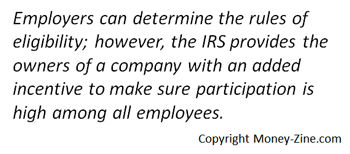For anyone that's thinking about contributing to their employer's 401(k) plan, but in need of more information, we have most of the 401(k) rules covered in this article. We use the word "most" because employers have some flexibility in how they can administer their 401(k) plans. In fact, only a plan administrator can provide all of the 401(k) rules that apply at a specific company. However, we can offer the general guidelines that will apply to anyone that participates in these plans at work.
401(k) Eligibility Rules
Additional Resources |
A 401(k) plan is a tax-deferred compensation plan structured to supply employees with income when retired. That means an employee can elect to contribute a portion of their compensation into this retirement plan on a pre-tax basis. Since this is tax-deferred compensation, a 401(k) can act as a tax shelter. Money placed into the plan can continue to grow on a tax-deferred basis until the funds are withdrawn. There are several eligibility rules that can apply to certain workers:
Employees that have not reached the age of 21 may not be eligible for this benefit.
Employees may be required to complete a year of service before participating in the plan.
Employees covered by a collective bargaining agreement may have discussed retirement benefits during negotiations, and they may have reached agreement not to participate in the 401(k) plan as part of that good-faith bargaining.
To set up a 401(k) plan, an employer only needs to comply with four requirements:
The plan must be in writing.
The plans assets must be in a trust fund.
The company needs to have a recordkeeping database.
Information needs to be provided to employees.
The employer can determine the exact rules of eligibility; however, the IRS has provided the owners, or highly-compensated employees, of a company with an added incentive to make sure participation is high among all employees.
Matching Employee Contributions
Each year, the 401(k) plan must pass a test the IRS has put together to make sure the benefits of this plan are proportional between the owners and the rank-and-file employees. If not enough of the rank-and-file employees participate in the plan, then no one gets to participate in the plan. This is one of the reasons that many employers have adopted the approach of matching employee contributions. By matching the contributions of employees, the plan provides an instant return on investment. This is simply too irresistible to many employees, and the resulting robust participation relieves the employer's concern over the annual test conducted by the IRS.
401(k) Contribution Rules
In 2020 and 2021, the total of both the employer and employee contributions to a 401(k) plan are subject to the following guidelines:
Total contributions may not exceed 100% of the employee's compensation.
Total contributions may not exceed $57,000 in 2020 and $58,000 in 2021.
In 2022 and later years, total contributions will be indexed to inflation and can move up in $1,000 increments.
Employees are further subject to these additional contribution rules:
In 2020 and 2021, the total contribution that an employee can make on a pre-tax basis is limited to $19,500.
In 2022, the total contribution that an employee can make will be calculated using an index for inflation, and can move up in $500 increments.
Note: Updated contribution limits are generally available in mid to late October.
Catch-Up Contributions
This final set of contribution rules applies to employees that are aged 50 and over. The IRS allows for additional catch-up contributions to 401(k) plans. The catch-up is $6,500 in 2020 and 2021. This means that in 2021, an employee aged 50 and over before the end of the calendar year can contribute up to $19,500 + $6,500, or $26,000. In 2022, that total will likely rise to levels above $26,000.

401(k) Vesting
When an employee makes a salary deferral, the money placed in the 401(k) plan is immediately 100% vested. This means the money always belongs to the employee, and cannot be forfeited for any reason. This also means that when an employee leaves a company, they are entitled to the total of any money they placed into the plan plus any gain on the investment, or minus any loss. With a traditional 401(k) plan, it is up to the employer to decide how the company contributions, if any, are vested. This vesting schedule will be part of the written documentation supplied to the IRS. Employees should consult with their 401(k) plan administrator if they have any questions concerning the vesting rules that apply in their situation.
About the Author - 401(k) Rules



.jpg)
.jpg)